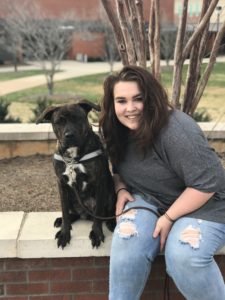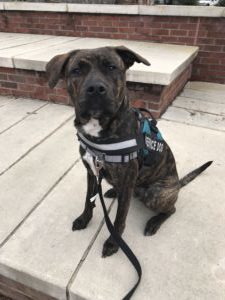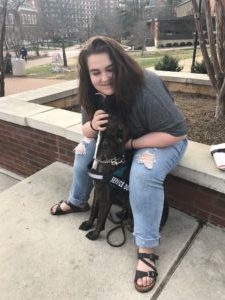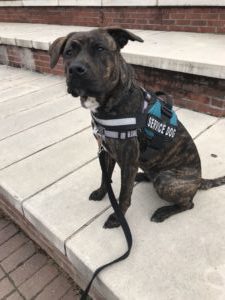Imagine being terrified to step out the door in the morning. Being terrified that someone might come up behind you in Walmart. Crying at the thought of confrontation. Waking up from terrifying nightmares.

Haleigh Harrison with O.S. Berkley. Photo by Jake Viers
This is what WCU freshmen Haleigh Harrison experiences every day.
Harrison was sexually assaulted at a party her junior year of high school.
At the party, someone drugged her drink and raped her. To this day, she still doesn’t know who attacked her.
As a result, she has Post Traumatic Stress Disorder (PTSD).
To help her cope with her symptoms, doctors recommended that Harrison get a service dog.
Harrison’s service dog, Operation Sidekick (O.S.) Berkley, came from the American Pit Bull Foundation (APBF) through their Operation Sidekick organization.
Traditionally, Operation Sidekick works with Pit Bulls Saving Heroes.
Operation Sidekick’s focus is working with veterans with PTSD because 22 veterans are lost to suicide a day, making suicide the leading cause of death in the military.
Due to family connection, Harrison has become the first sexual assault victim to get a dog through their program.
Since the pit bulls are trained to sense PTSD symptoms, Harrison is the perfect civilian to enter the program.
Berkley will alert Harrison whenever her symptoms are being triggered. For example, Berkley can sense when Harrison’s anxiety begins to pick up and alert her.
Berkley alerts Harrison by jumping on her or whining at her in public and jumping on her bed to wake her from a nightmare.
These are called medical alerts.
Since Berkley gives Harrison medical alerts, that’s what makes Berkley a service dog rather than an emotional support animal (ESA).
Harrison couldn’t be happier to have a service dog to help her.

Operation Sidekick Berkley. Photo by Haleigh Harrison
“She’s definitely made a huge impact on my life,” said Harrison. “I’m so happy I have her.”
While Berkley has made it a lot easier for Harrison to cope with her symptoms, Harrison has experienced some negative interactions between herself and WCU since having Berkley.
The first problem Harrison faced was having Berkley approved by the campus.
At WCU, students that need specific living requirements must fill out a request for housing accommodation through Residential Living. The accommodations include having a service animal or emotional support animal, needing a room equipped for hearing-impairment, a wheelchair accessible room, a personal care attendant and an air-conditioned room.
Harrison filled out the form and sent it to residential living. However, Lisa Surber, the Room Assignments Coordinator for Residential Living, was out for two weeks and was unable to approve Harrison’s request.
The Executive Director for Residential Living, Bryant Barnett, confirmed that the process of approving an animal can last anywhere from a day to two weeks. For the approval to last about two weeks, that depends on if Surber or Wesley Satterwhite, the Director of the Office of Accessibility Resources, are out of the office and how many requests are pending at the time.
“I would say typically within a two-week period,” said Barnett. “That is the max, but again, if you have Lisa not here or Wesley not here or there’s craziness going on, I won’t say it can’t last longer than that.”
If the approval takes longer than two weeks, Barnett says that is a result of the documentation lacking all the information needed.
Another problem Harrison has endured was denied access to the Courtyard Cafeteria and Chili’s. Just in the last couple of weeks, Harrison had been eating at Chili’s when she had been asked to leave because of Berkley.
The biggest problem that Harrison has faced on campus was an incident she had with the Cat Tran.
Harrison and a group of her friends were leaving the Hunter Library late at night and tried to catch a ride on the Cat Tran.
At the Cat Tran, the driver ambushed Harrison with questions about Berkley and accused Berkley of being an ESA, which aren’t allowed on Cat Trans.
The Cat Tran driver also accused Harrison of buying a vest online, claiming Berkley wasn’t a real service dog.
“No, she alerts me,” Harrison told the driver.
As Harrison tried to tell the driver that Berkley was really a service, Berkley began to bark at Harrison, telling her to walk away due to her anxiety.

According to Harrison, Berkley is much more than a service dog. Photo by Jake Viers
“It was getting to point where I was crying to this lady like she messed me up that bad,” said Harrison.
Eventually, Harrison and her friends walked away, but the incident only served to make Harrison feel unsafe.
Legally, faculty and staff are allowed to ask two questions:
- Is this animal required for you as a person with a disability?
- What work or task is this dog trained to perform?
However, according to WCU’s animal policy on campus, these questions are only asked when it is not obvious that the dog is a service animal.
In Harrison’s case, Berkley was wearing a vest, so the Cat Tran driver wasn’t permitted to ask those questions.
Some of Harrison’s friends had gone back to get the Cat Tran driver’s information, so she could contact the CEO of Operation Sidekick, Sara Enos.
Enos contacted her lawyers, and the next day, a letter was sent to the university stating that if Harrison was denied access on a Cat Tran again, she would sue.
After the incident, Harrison filed a complaint with the university and the dean.
However, Kevin Koett, the Dean of Students, contacted Harrison accusing her of not complying to the questions that Cat Tran driver asked her.
Koett told Harrison that the driver portrayed the story differently, stating that Harrison refused to answer the questions that the driver asked.
When you deny someone with a service animal access, that’s breaking a federal law.
The American with Disabilities Act (ADA), introduced in 1990, is a civil rights law that prohibits the discrimination of individuals with disabilities in jobs, school, transportation and all public or private places that are open to the general public.
In 2008, the Americans with Disabilities Act Amendments (ADAA) was created and became effective Jan. 1, 2009. The ADAA redefined the term disability as “a physical or mental impairment that substantially limits one or more major life activities, a record of such an impairment, or being regarded as having such an impairment.”
Since Berkley is a service dog in training, she isn’t protected by these.
However, Berkley is protected at the state level.
The Fair Housing Act allows Harrison to have Berkley in her Residence hall because it provides regulation for “assistance animals” in all forms of housing.
North Carolina State law protects service dogs in training just like fully vested service dogs.
Click here for a look at service animals versus emotional support animals.
Here at WCU, Satterwhite says that service dogs in training are treated the same as service dogs as long as they are being trained to perform a specific task to aid the person with a disability.
The university told Harrison’s lawyers that the university was in the right.
Harrison concedes that the driver was initially right to ask questions, but the driver crossed the line.
“To an extent, they did the right thing by asking the questions but after she crossed the line of asking two questions, they are in the wrong,” said Harrison. “They won’t admit it.”
With that being said, Harrison provides some advice on dealing with service animals.

Berkley is wearing her service animal training vest. In August, she’ll be fully vested. Photo by Haleigh Harrison
First, don’t buy your dog’s vest online. According to Harrison, it’s obvious when a dog is not a real service animal, and it only causes issues for people that really do have service animals.
For example, there was a case of service dogs in training last year through the organization Service Dogs Warren Retrievers (SDWR) that had students giving puppies basic obedience training and socialization.
At this point, Satterwhite says that they aren’t service dogs in training and that the company had unethical practices that only hurt students with a legitimate need.
“I think that’s the biggest travesty of people that don’t follow the rules that it’s a lot harder for those with a legitimate need,” said Satterwhite.
Secondly, don’t pet a service animal unless you have permission from the owner.
“You could completely distract that dog from doing its job and it could hurt that person,” said Harrison. “Like with me, it snaps her out of work and it’s hard when I get anxious, and it causes me to have an anxiety attack because I’ll be out in public trying to get her to focus back on me. Once you put that vest on, they are trained to work.”
Harrison also offers some advice for those that may be going through a similar situation.
“If you haven’t told someone, you should tell someone,” said Harrison. “I thought I was better off not telling anyone and once I told my parents it was like a weight lifted off my shoulder.”
Prior to coming to college, Harrison had not told anyone about what had happened.
It wasn’t until her first day of Criminology class when Sgt. Jacob Deal, the Victim Services Practitioner from WCU’s Police Department, came to talk about rape that she felt compelled to tell someone.
Deal wants to reach out to students that may not know how, why or feel too uncomfortable to seek those resources that they need, so they can receive help.
“My phone number is available to everyone, and I’m happy to help victims,” said Deal. “I encourage victims to reach out to me.”
By coming forward, Harrison was able to get the help she needed and, ultimately, get Berkley.
If you or someone you know needs help, please contact Sgt. Jacob Deal at jpdeal@wcu.edu or call him at 828-227-3207.


